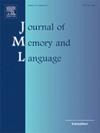A distinctive meaning makes a sentence memorable
IF 3
1区 心理学
Q1 LINGUISTICS
引用次数: 0
Abstract
Prior work on visual memory has suggested that humans have a high-capacity but imperfect memory: image representations accumulate noise over time, which makes similar images confusable. This account – the noisy representation hypothesis – was recently extended to the verbal domain: in line with past evidence that words are encoded in memory by their meanings, it was shown that words with distinctive meanings are most memorable. Here, we leverage recent advances in natural language processing to ask whether the same holds true for compositional linguistic stimuli — sentences. In a recognition memory experiment with responses from 443 participants to 2500 six-word-long target sentences, we found that a sentence’s semantic distinctiveness – as estimated through contextual representations from a large language model – predicts the accuracy and speed of its recognition. These effects were observed for both intrinsic sentence memorability (distinctiveness of a sentence relative to a large corpus of sentences) and contextual memorability (distinctiveness relative to recently encountered sentences in the experiment), and cannot be reduced to properties of the sentence’s constituent words. Our findings suggest that sentence memorability, similar to image and word memorability, is related to meaning distinctiveness, thus extending the noisy representation hypothesis to compositional linguistic stimuli.
一个独特的意思使一个句子令人难忘
先前关于视觉记忆的研究表明,人类具有高容量但不完美的记忆:随着时间的推移,图像表征会积累噪音,这使得类似的图像容易混淆。这种说法——嘈杂表征假说——最近被扩展到语言领域:与过去的证据一致,即单词是通过它们的含义在记忆中编码的,研究表明,具有独特含义的单词最容易被记住。在这里,我们利用自然语言处理的最新进展来询问是否同样适用于组合语言刺激-句子。在一项由443名参与者对2500个6个单词长的目标句子的反应进行的识别记忆实验中,我们发现一个句子的语义独特性——通过一个大型语言模型的上下文表征来估计——预测了其识别的准确性和速度。这些影响是在句子的内在记忆性(一个句子相对于大量句子的独特性)和上下文记忆性(相对于实验中最近遇到的句子的独特性)中观察到的,并且不能归结为句子组成词的属性。我们的研究结果表明,句子记忆能力与图像和单词记忆能力类似,与意义独特性有关,从而将噪声表征假说扩展到组合语言刺激。
本文章由计算机程序翻译,如有差异,请以英文原文为准。
求助全文
约1分钟内获得全文
求助全文
来源期刊
CiteScore
8.70
自引率
14.00%
发文量
49
审稿时长
12.7 weeks
期刊介绍:
Articles in the Journal of Memory and Language contribute to the formulation of scientific issues and theories in the areas of memory, language comprehension and production, and cognitive processes. Special emphasis is given to research articles that provide new theoretical insights based on a carefully laid empirical foundation. The journal generally favors articles that provide multiple experiments. In addition, significant theoretical papers without new experimental findings may be published.
The Journal of Memory and Language is a valuable tool for cognitive scientists, including psychologists, linguists, and others interested in memory and learning, language, reading, and speech.
Research Areas include:
• Topics that illuminate aspects of memory or language processing
• Linguistics
• Neuropsychology.

 求助内容:
求助内容: 应助结果提醒方式:
应助结果提醒方式:


